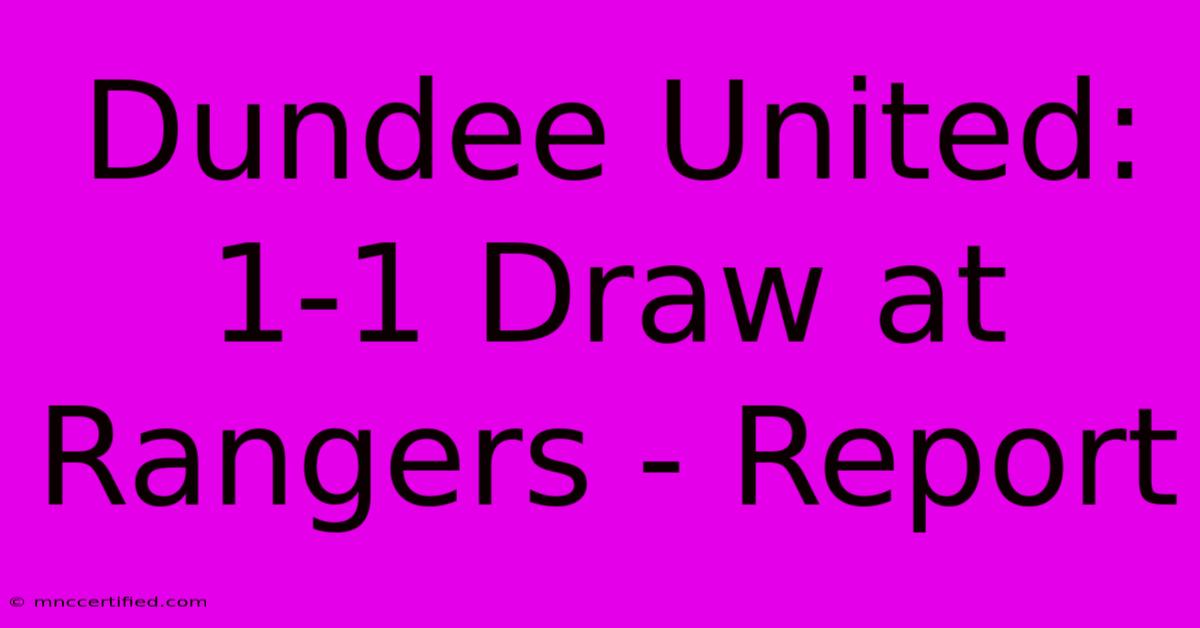Dundee United: 1-1 Draw At Rangers - Report

Table of Contents
Dundee United: 1-1 Draw at Ibrox - A Resilient Performance Against Rangers
Dundee United secured a hard-fought 1-1 draw against Rangers at Ibrox Stadium, a result that surprised many and showcased the Tangerines' resilience and tactical prowess. The match, a thrilling encounter from start to finish, highlighted both the strengths and weaknesses of both sides. This report will delve into the key moments, tactical approaches, and overall implications of this impressive away point for Dundee United.
A Tactical Masterclass? Dundee United's Defensive Resilience
Dundee United's performance wasn't just about luck; it was a testament to their well-structured defensive strategy. Manager [Manager's Name] clearly set his team up to frustrate Rangers, employing a disciplined, compact shape that limited the home side's attacking space. This involved [mention specific tactical formations and strategies, e.g., deep-lying midfielders, pressing triggers, zonal marking]. The effectiveness of this approach was evident in the limited clear-cut chances Rangers managed to create throughout the game.
Key Defensive Performances
Several players deserve special mention for their outstanding defensive contributions. [Player's Name], in particular, displayed exceptional reading of the game and timely interceptions, thwarting several potentially dangerous Rangers attacks. His performance exemplifies the overall team spirit and defensive solidity that characterized Dundee United's play. [Mention other key players and their roles, e.g., strong tackles, aerial duels won].
Rangers' Frustration and Missed Opportunities
Despite their dominance in possession, Rangers struggled to break down Dundee United's resolute defense. Their creative players, such as [mention key Rangers players], found themselves consistently stifled by Dundee United's organized structure. While Rangers had periods of pressure, their finishing lacked clinical precision, with several chances going begging. This inefficiency in front of goal allowed Dundee United to stay in the game and ultimately snatch a point.
Analyzing Rangers' Tactical Approach
Rangers' approach appeared to be based on [analyze Rangers' tactical approach - e.g., wide play, through balls, crosses]. However, Dundee United's defense proved adept at neutralizing these threats. The failure to adjust their approach in the face of Dundee United's defensive resilience ultimately cost them the win. A lack of penetration from midfield and a failure to exploit the spaces behind the Dundee United defense highlighted a potential weakness in their game plan.
The Goal: A Moment of Brilliance Against the Odds
Dundee United's goal, scored by [Player's Name], was a moment of individual brilliance, showcasing the attacking threat they possess even when playing defensively. [Describe the goal in detail - e.g., the build-up play, the type of shot, the positioning of the player]. This goal served as a reminder that Dundee United are not just a defensive team; they possess the capacity to create and score goals, even against top-tier opposition like Rangers.
Post-Match Analysis and Implications
The 1-1 draw at Ibrox represents a significant result for Dundee United. It demonstrates their ability to compete at the highest level, showcasing both defensive resilience and moments of attacking flair. The result will undoubtedly boost the team's confidence and morale, providing a much-needed lift for the rest of the season. For Rangers, the draw highlights the need for improved clinical finishing and tactical flexibility when facing well-organized defensive units.
Looking Ahead
Dundee United will look to build on this positive result, aiming to replicate their defensive strength and attacking efficiency in future matches. Their performance at Ibrox serves as a blueprint for how to effectively compete against stronger opponents. The match also provides a valuable lesson for Rangers – the need to adapt and overcome stubborn defensive formations.
Keywords: Dundee United, Rangers, Ibrox, 1-1 draw, Scottish Premiership, football, soccer, match report, tactical analysis, defensive resilience, attacking flair, [Manager's Name], [Key Players' Names].

Thank you for visiting our website wich cover about Dundee United: 1-1 Draw At Rangers - Report. We hope the information provided has been useful to you. Feel free to contact us if you have any questions or need further assistance. See you next time and dont miss to bookmark.
Featured Posts
-
Erivos Wicked Comments Spark Debate
Nov 24, 2024
-
Rangers 1 1 Dundee Clements Salvage
Nov 24, 2024
-
Georgia Dominates U Mass Final Score
Nov 24, 2024
-
Watch Aston Villa Vs Crystal Palace Live
Nov 24, 2024
-
December Real Madrid Vs Messi
Nov 24, 2024